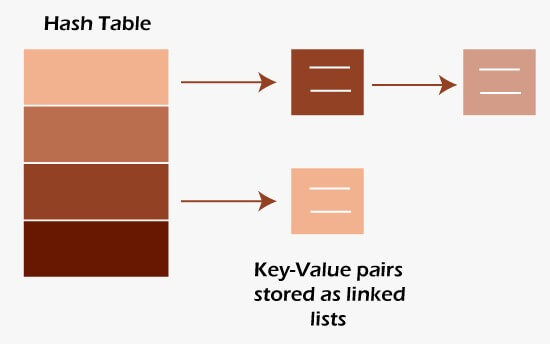C++ 哈希程序与链式处理
哈希表链式处理到底是什么
链式处理是一种哈希表中避免碰撞的技术。
碰撞发生在哈希表中的两个键被哈希到相同索引的情况下。碰撞是一个问题,因为哈希表中的每个槽位只能容纳一个元素。

链接法
链接法中的哈希表是一个链表数组,每个索引都有自己的链表。
将到达相同索引的所有键值对存储在该索引的链表中。
链接法的优点
- 哈希表中的插入总是通过链接进行,因为链表允许在常数时间内插入。
- 链接哈希表在有足够空间的情况下可以理论上无限增长。
- 链接哈希表永远不需要重新调整大小。
链接法的实现
让我们编写一个哈希函数,以确保我们的哈希表具有“N”个桶。
要将节点添加到哈希表中,我们必须首先确定给定键的哈希索引。也可以使用哈希函数进行计算。
示例:hashIndex = key%noOfBuckets
插入: 移动到对应于上面计算的哈希索引的桶,并在列表末尾插入新节点。
删除: 要从哈希表中删除节点,计算密钥的哈希索引,移动到对应于计算的哈希索引的桶,搜索当前桶中的列表以查找具有给定键的节点,并将其删除(如果找到)。
算法
用于插入:
Begin
Declare Function Insert(int k, int v)
int hash_v = HashFunc(k)
HashTableEntry* p = NULL
HashTableEntry* en = ht[hash_v]
while (en!= NULL)
p = en
en= en->n
if (en == NULL)
en = new HashTableEntry(k, v)
if (p == NULL)
ht[hash_v] = en
else
p->n= en
else
en->v = v
End.
删除:
Begin
Declare Function Remove(int k)
int hash_v = HashFunc(k)
HashTableEntry* en = ht[hash_v]
HashTableEntry* p= NULL
if (en == NULL or en->k != k)
Print "No Element found at key"
return
while (en->n != NULL)
p = en
en = en->n
if (p != NULL)
p->n = en->n
delete en
Print "Element Deleted"
End.
搜索:
Begin
Declare function SearchKey(int k)
int hash_v = HashFunc(k)
bool flag = false
HashTableEntry* en = ht[hash_v]
if (en != NULL)
while (en != NULL)
if (en->k == k)
flag = true
if (flag)
Print "Element found at key"
Print en->v
en = en->n
if (!flag)
Print "No Element found at key"
End.
代码
#include
const int T_S = 200;
using namespace std;
struct HashTableEntry {
int v, k;
HashTableEntry *n;
HashTableEntry *p;
HashTableEntry(int k, int v) {
this->k = k;
this->v = v;
this->n = NULL;
}
};
class HashMapTable {
public:
HashTableEntry **ht, **top;
HashMapTable() {
ht = new HashTableEntry*[T_S];
for (int i = 0; i < T_S; i++)
ht[i] = NULL;
}
int HashFunc(int key) {
return key % T_S;
}
void Insert(int k, int v) {
int hash_v = HashFunc(k);
HashTableEntry* p = NULL;
HashTableEntry* en = ht[hash_v];
while (en!= NULL) {
p = en;
en = en->n;
}
if (en == NULL) {
en = new HashTableEntry(k, v);
if (p == NULL) {
ht[hash_v] = en;
} else {
p->n = en;
}
} else {
en->v = v;
}
}
void Remove(int k) {
int hash_v = HashFunc(k);
HashTableEntry* en = ht[hash_v];
HashTableEntry* p = NULL;
if (en == NULL || en->k != k) {
cout<<"No Element found at key "<n != NULL) {
p = en;
en = en->n;
}
if (p != NULL) {
p->n = en->n;
}
delete en;
cout<<"Element Deleted"<k == k) {
flag = true;
}
if (flag) {
cout<<"Element found at key "<v<n;
}
}
if (!flag)
cout<<"No Element found at key "<>c;
switch(c) {
case 1:
cout<<"Enter element to be inserted: ";
cin>>v;
cout<<"Enter key at which element to be inserted: ";
cin>>k;
hash.Insert(k, v);
break;
case 2:
cout<<"Enter key of the element to be searched: ";
cin>>k;
hash.SearchKey(k);
break;
case 3:
cout<<"Enter key of the element to be deleted: ";
cin>>k;
hash.Remove(k);
break;
case 4:
exit(1);
default:
cout<<"\nEnter correct option\n";
}
}
return 0;
}
输出
1. Insert element into the table
2. Search element from the key
3. Delete element at a key
4. Exit
Enter your choice: 1
Enter element to be inserted: 2
Enter key at which element to be inserted: 1
1. Insert element into the table
2. Search element from the key
3. Delete element at a key
4. Exit
Enter your choice: 1
Enter element to be inserted: 3
Enter key at which element to be inserted: 4
1. Insert element into the table
2. Search element from the key
3. Delete element at a key
4. Exit
Enter your choice: 1
Enter element to be inserted: 7
Enter key at which element to be inserted: 6
1. Insert element into the table
2. Search element from the key
3. Delete element at a key
4. Exit
Enter your choice: 1
Enter element to be inserted: 8
Enter key at which element to be inserted: 9
1. Insert element into the table
2. Search element from the key
3. Delete element at a key
4. Exit
Enter your choice: 2
Enter key of the element to be searched: 6
Element found at key 6: 7
1. Insert element into the table
2. Search element from the key
3. Delete element at a key
4. Exit
Enter your choice: 2
Enter key of the element to be searched: 7
No Element found at key 7
1. Insert element into the table
2. Search element from the key
3. Delete element at a key
4. Exit
Enter your choice: 3
Enter key of the element to be deleted: 9
Element Deleted
1. Insert element into the table
2. Search element from the key
3. Delete element at a key
4. ExitC
Enter your choice: 4
时间复杂度
- 查找: O(1+(n/m))
- 删除: O(1+(n/m))
- 其中 n = 哈希表中的槽数 m = 要插入的键的数量,这里 n/m 是负载因子。
- 负载因子必须尽可能小。
 极客笔记
极客笔记